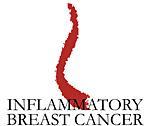During my years as a navigator, I met with  thousands of women and some men with breast cancer, but only a handful had Inflammatory Breast Cancer. Since then, I’ve met a few more women with this rare form of breast cancer through my blogging.
thousands of women and some men with breast cancer, but only a handful had Inflammatory Breast Cancer. Since then, I’ve met a few more women with this rare form of breast cancer through my blogging.
The National Cancer Institute (NCI) describes Inflammatory Breast Cancer as a rare, yet aggressive form of breast cancer that blocks the lymph vessels in the skin of the breast. Inflammatory Breast Cancer presents without a lump. The symptoms typically appear rapidly and include swelling, redness, warmth in the breast, ridged or pitted skin, heaviness and a burning or aching sensation.
According to NCI, Inflammatory Breast Cancer progresses rapidly, often in a matter of weeks or months. Inflammatory Breast Cancer is either stage III or IV at diagnosis, depending on whether cancer cells have spread only to nearby lymph nodes or to other tissues as well.
NCI identifies other features of Inflammatory Breast Cancer as follows:
- Compared with other types of breast cancer, inflammatory breast cancer tends to be diagnosed at younger ages.
- It is more common and diagnosed at younger ages in African-American women than in Caucasian women.
- Inflammatory breast tumors are frequently hormone receptor negative, which means that hormone therapies, such as tamoxifen, that interfere with the growth of cancer cells fueled by estrogen may not be effective against these tumors.
With the advent of the Internet, it became possible for women and men affected by this rare form of breast cancer to come together, on line, for comfort and support and to share information about treatment. It was just this kind of coming together that brought about The Inflammatory Breast Cancer Research Foundation, the first organized, non-profit inflammatory breast cancer patient advocacy group, incorporated in 1999.
The founder and president, Owen Johnson, was the person behind starting the organization after losing his wife to Inflammatory Breast Cancer (IBC). The group wanted to focus on facilitating research of IBC, since little was being done at that time, and there needed to be a voice for action.
I recently had the opportunity to speak with Ginny Mason, R.N., Executive Director of The Inflammatory Breast Cancer Research Foundation, and a long-time survivor of Inflammatory Breast Cancer. Ms. Mason described the foundation as dedicated to facilitating research to improve diagnosis, treatment, and survival of Inflammatory Breast Cancer while also raising awareness of the disease in the lay and medical communities.
She expanded on the use of the term “facilitating” research stating, “Because we do much more than simply fund research, facilitating might mean helping develop a clinical trial, help patients access clinical trials, work with individual researchers on projects, participate in drug development, etc.”
Ms. Mason shared that the foundation remains a small, focused group that has a far reaching impact. The foundation has no walk-in office. She stated, “In an effort to direct our resources to the our mission, we are all volunteers who work from our homes. Since we work with people all over the world, it doesn’t make sense to have a local office. We are a true 21st century organization with our headquarters in cyberspace!
We are funded solely by private donations (however we have received two small grants for our award-winning BioBank program). We remain independent…meaning not affiliated with any specific medical facility or academic organization, so we can truly act as advocates for those who contact us and encourage collaboration.”
Ms. Mason spoke to the importance of individuals affected by IBC to be advocates in their communities by sharing their stories in the media and with groups. There are opportunities for individuals to represent the organization at various functions. Individuals and groups are encouraged to organize and hold events that both raise awareness and funds for IBC research. The foundation welcomes anyone who wants to find ways of volunteering with the organization.
Ms. Mason shared the following foundation accomplishments:
- In 2005, we began an Inflammatory Breast Cancer biorepository to aid researchers in the study of IBC. The Inflammatory Breast Cancer Research Foundation BioBank is one of just a handful of advocacy owned and operated tissue banks in the country.
- Have a website, monthly e-newsletter, and toll-free number. Individuals can access a trained volunteer with questions. Using email,the foundation shares information, education, and support with those in the IBC community.
- Have an outstanding Medical Advisory Board who oversee our BioBank and provide input and guidance on our work as an organization.
- Worked with the National Comprehensive Cancer Network (NCCN) to develop a specific Treatment Guideline for Inflammatory Breast Cancer and update the Breast Cancer Screening Guidelines to include detailed and thorough steps to rule out Inflammatory Breast Cancer in patients presenting with skin changes. These were both much needed materials to improve the diagnosis and treatment of patients.
- Have a tri-fold educational/informational brochure available on our website in pdf that can be downloaded and printed for people to share, or they can order them and bookmarks from our website. They’re a great way to educate folks about IBC.
- Awarded two research grants last year (2011) totaling $100,000. One to a researcher with TGen in Phoenix, AZ. The second to a clinician/researcher at Dana Farber Cancer Institute in Boston, MA. Since 2009 we’ve been able to fund nearly $300,000 worth of IBC specific research.
If you, or someone you know, is dealing with Inflammatory Breast Cancer, use the contact information below to get in touch with those who understand what you are going through.
Contact information:
Website: www.ibcresearch.org
Toll Free: 877-786-7422

